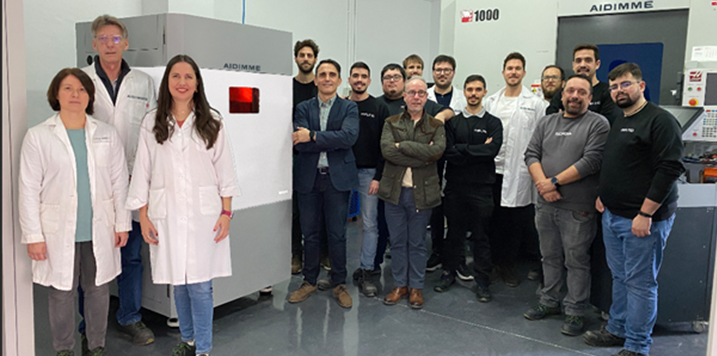 10 July, 2024
10 July, 2024The ATILA research project today announced a significant breakthrough in the field of 3D printing of biomedical implants. The Valencian research centre Aidimme has installed a prototype 3D printing technology to create, for the first time in Spain, biomedical implants made of titanium alloys. This unique technology is being developed by the Spanish multinational Meltio, based in Linares (Jaén).
The ATILA project, composed of a consortium of different entities, investigates biomedical implant applications with Ti64-ELI titanium, using Meltio's advanced 3D printing technology. This technology, which uses welding wire instead of metal powder, offers greater efficiency, less waste and a less polluting process, helping to reduce the carbon footprint.
ATILA Project DetailsFunded by the Ministry of Science and Innovation and the State Research Agency, the ATILA project is part of the State Plan for Scientific, Technical and Innovation Research 2021-2023. Led by Aidimme, the consortium includes the Research Foundation of the General University Hospital of Valencia (FIHGUV), the Laser Applications and Photonics research group of the University of Salamanca (ALF USAL) and Meltio.
The direct metal laser deposition (DED-LB/M) additive manufacturing process allows parts to be built by adding raw material in the form of powder or wire. DED-LB/M technology with wire has several advantages, such as a lower contamination process, a good deposition rate, relatively low costs and a high raw material utilisation of close to 100%.
One of the challenges of working with titanium is its high reactivity with oxygen, which can negatively affect the quality of the material. During additive manufacturing, titanium tends to pick up oxygen due to the temperature increase during melting and deposition of successive layers. The oxygen content should not exceed the limits set by the reference standards UNE-EN ISO 5832-3:2017 and ASTM F136-21 for surgical implants.
Development and Future of the ProjectIn the framework of the ATILA project, a prototype based on DED-LB/M technology has been developed and integrated, which is receiving its final improvements in 2024. This new process will allow better control of thermal gradients, ensuring a metallurgy suitable to the demanding standards for Ti6Al4V ELI processing.
During June 2024, a technical meeting of the project was held at Aidimme's facilities, where researchers from Aidimme, USAL and FIHGUV met with Meltio. They discussed regulations, possible candidates for implants to be manufactured and the numerical simulation under development by the USAL, objectives of the ATILA project.
Aidimme is a Technological Institute registered as an Innovative Business Group (AEI). Its mission is to increase the competitiveness of companies through the design and development of products, innovative materials and advanced and sustainable processes of supply, manufacturing, logistics, distribution and services.
Over the last forty years, Aidimme has adapted its business model, evolving from a vertical focus on specific sectors to a more open and diversified model. It currently works in sectors such as Furniture, Housing and Building; Metalworking and Capital Goods; Automotive and Transport; Wood, Metals and other Materials; and Consumer Goods, among others.
 10 July, 2024The ATILA research project today announced a significant breakthrough in the field of 3D printing of biomedical implants. The Valencian research centre Aidimme has installed a prototype 3D printing technology to create, for the first time in Spain, biomedical implants made of titanium alloys. This unique technology is being developed by the Spanish multinational Meltio, based in Linares (Jaén).
10 July, 2024The ATILA research project today announced a significant breakthrough in the field of 3D printing of biomedical implants. The Valencian research centre Aidimme has installed a prototype 3D printing technology to create, for the first time in Spain, biomedical implants made of titanium alloys. This unique technology is being developed by the Spanish multinational Meltio, based in Linares (Jaén).